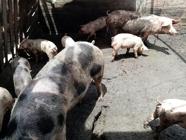Abstract
Backyard pigs have been associated with poor sanitary conditions and the development of parasitic diseases, often causing public health and food safety problems. Therefore, the aim of this study was to determine the prevalence and risk factors for gastrointestinal parasites in backyard pigs. 279 animals were sampled from thirty-two backyard pig farms located in the Bucaramanga, Floridablanca, Giron and Piedecuesta municipalities, from Bucaramanga Metropolitan Area, Colombia. Fecal samples were taken directly from the rectum and processed by four coprological techniques. The overall prevalence of gastrointestinal parasites was 91%, being the highest values for Balantidium coli and Eimeria sp. Regarding the prevalence by municipalities, there was no statistical association (p ≥ 0.05) indicating that the prevalence was similar in the region under study. Floridablanca municipality, free-ranging pigs, access to latrines, and consumption of spring water showed to be a risk factor for nematodes, while Giron municipality, pigs > 7 months of age and access to latrines, increased infection risk for coccidian. We concluded that there is a high prevalence of gastrointestinal parasites in backyard pigs from the Bucaramanga Metropolitan Area, and that it could be controlled by improving management practices and farm facilities.
Keywords:
Backyard pigs; gastrointestinal parasitism; nematodes; protozoan

 Thumbnail
Thumbnail
 Thumbnail
Thumbnail

